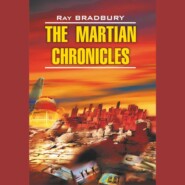По всем вопросам обращайтесь на: info@litportal.ru
(©) 2003-2024.
✖
The Martian Chronicles
Автор
Год написания книги
2018
Настройки чтения
Размер шрифта
Высота строк
Поля
He kicked them. Then he rapped on the ship.
‘It persists! They persist!’ He fired his gun again at the bodies. Then he stood back. The smiling mask dropped from his face.
Slowly the little psychologist’s face changed. His jaw sagged. The gun dropped from his fingers. His eyes were dull and vacant. He put his hands up and turned in a blind circle. He fumbled at the bodies, saliva filling his mouth.
‘Hallucinations,’ he mumbled frantically. ‘Taste. Sight. Smell. Sound. Feeling.’ He waved his hands. His eyes bulged. His mouth began to give off a faint froth.
‘Go away!’ he shouted to the bodies. ‘Go away!’ he screamed at the ship. He examined his trembling hands. ‘Contaminated,’ he whimpered wildly. ‘Carried over into me. Telepathy. Hypnosis. Now I’m insane. Now I’m contaminated. Hallucinations in all their sensual forms.’ He stopped and searched around with his numb hands for the gun. ‘Only one cure. Only one way to make them go away, vanish.’
A shot rang out. Mr Xxx fell.
The four bodies lay in the sun. Mr Xxx lay where he fell.
The rocket reclined on the little sunny hill and didn’t vanish.
When the town people found the rocket at sunset they wondered what it was. Nobody knew, so it was sold to a junkman and hauled off to be broken up for scrap metal.
That night it rained all night. The next day was fair and warm.
MARCH 2000 (#ulink_0ff65bb9-c3fb-5216-93b6-f8c587bc5687)
The Taxpayer (#ulink_0ff65bb9-c3fb-5216-93b6-f8c587bc5687)
He wanted to go to Mars on the rocket. He went down to the rocketfield in the early morning and yelled in through wire fence at the men in uniform that he wanted to go to Mars. He told them he was a taxpayer, his name was Pritchard, and he had a right to go to Mars. Wasn’t he born right here in Ohio? Wasn’t he a good citizen? Then why couldn’t he go to Mars? He shook his fists at them and told them that he wanted to get away from Earth; anybody with any sense wanted to get away from Earth. There was going to be a big atomic war on Earth in about two years, and he didn’t want to be here when it happened. He and thousands of others like him, if they had any sense, would go to Mars. See if they wouldn’t! To get away from wars and censorship and statism and conscription and government control of this and that, of art and science! You could have Earth! He was offering his good right hand, his heart, his head, for the opportunity to go to Mars! What did you have to do, what did you have to sign, whom did you have to know, to get on the rocket?
They laughed out through the wire screen at him. He didn’t want to go to Mars, they said. Didn’t he know that the First and Second Expeditions had failed, had vanished; the men were probably dead?
But they couldn’t prove it, they didn’t know for sure, he said, clinging to the wire fence. Maybe it was a land of milk and honey up there, and Captain York and Captain Williams had just never bothered to come back. Now were they going to open the gate and let him in to board the Third Expeditionary Rocket, or was he going to have to kick it down?
They told him to shut up.
He saw the men walking out to the rocket.
‘Wait for me!’ he cried. ‘Don’t leave me here on this terrible world, I’ve got to get away; there’s going to be an atom war! Don’t leave me on Earth!’
They dragged him, struggling, away. They slammed the police wagon door and drove him off into the early morning, his face pressed to the rear window, and just before they sirened over a hill, he saw the red fire and heard the big sound and felt the huge tremor as the silver rocket shot up and left him behind on an ordinary Monday morning on the ordinary planet Earth.
APRIL 2000 (#ulink_7d2fdc83-5c0b-5cdf-825f-c15bf6dd1f5a)
The Third Expedition (#ulink_7d2fdc83-5c0b-5cdf-825f-c15bf6dd1f5a)
The ship came down from space. It came from the stars, and the black velocities, and the shining movements, and the silent gulfs of space. It was a new ship; it had fire in its body and men in its metal cells, and it moved with a clean silence, fiery and warm. In it were seventeen men, including a captain. The crowd at the Ohio field had shouted and waved their hands up into the sunlight, and the rocket had bloomed out great flowers of heat and colour and run away into space on the third voyage to Mars?
Now it was decelerating with metal efficiency in the upper Martian atmospheres. It was still a thing of beauty and strength. It had moved in the midnight waters of space like a pale sea leviathan; it had passed the ancient moon and thrown itself onward into one nothingness following another. The men within it had been battered, thrown about, sickened, made well again, each in his turn. One man had died, but now the remaining sixteen, with their eyes clear in their heads and their faces pressed to the thick glass ports, watched Mars swing up under them.
‘Mars!’ cried Navigator Lustig.
‘Good old Mars!’ said Samuel Hinkston, archaeologist.
‘Well,’ said Captain John Black.
The rocket landed on a lawn of green grass. Outside, upon this lawn, stood an iron deer. Farther up on the green stood a tall brown Victorian house, quiet in the sunlight, all covered with scrolls and rococo, its windows made of blue and pink and yellow and green coloured glass. Upon the porch were hairy geraniums and an old swing which was hooked into the porch ceiling and which now swung back and forth, back and forth, in a little breeze. At the summit of the house was a cupola with diamond leaded-glass windows and a dunce-cap roof! Through the front window you could see a piece of music titled ‘Beautiful Ohio’ sitting on the music-rest.
Around the rocket in four directions spread the little town, green and motionless in the Martian spring. There were white houses and red brick ones, and tall elm-trees blowing in the wind, and tall maples and horse-chestnuts. And church steeples with golden bells silent in them.
The rocket men looked out and saw this. Then they looked at one another and then they looked out again. They held to each other’s elbows, suddenly unable to breathe, it seemed. Their faces grew pale.
‘I’ll be damned,’ whispered Lustig, rubbing his face with his numb fingers. I’ll be damned.’
‘It just can’t be,’ said Samuel Hinkston.
‘Lord,’ said Captain John Black.
There was a call from the chemist. ‘Sir, the atmosphere is thin for breathing. But there’s enough oxygen. It’s safe.’
‘Then we’ll go out,’ said Lustig.
‘Hold on,’ said Captain John Black. ‘How do we know what this is?’
‘It’s a small town with thin but breathable air in it, sir.’
‘And it’s a small town the like of Earth towns,’ said Hinkston, the archaeologist. ‘Incredible. It can’t be, but it is.’
Captain John Black looked at him idly. ‘Do you think that the civilizations of two planets can progress at the same rate and evolve in the same way, Hinkston?’
‘I wouldn’t have thought so, sir.’
Captain Black stood by the port. ‘Look out there. The geraniums. A specialized plant. That specific variety has only been known on Earth for fifty years. Think of the thousands of years it takes to evolve plants. Then tell me if it is logical that the Martians should have: one, leaded-glass windows; two, cupolas; three, porch swings; four, an instrument that looks like a piano and probably is a piano; and five, if you look closely through this telescope lens here, is it logical that a Martian composer would have published a piece of music titled, strangely enough, “Beautiful Ohio”? All of which means that we have an Ohio River on Mars!’
‘Captain Williams, of course!’ cried Hinkston.
‘What?’
‘Captain Williams and his crew of three men! Or Nathaniel York and his partner. That would, explain it!’
‘That would explain absolutely nothing. As far as we’ve been able to figure, the York expedition exploded the day it reached Mars, killing York and his partner. As for Williams and his three men, their ship exploded the second day after their arrival. At least the pulsations from their radios ceased at that time, so we figure that if the men were alive after that they’d have contacted us. And anyway, the York expedition was only a year ago, while Captain Williams and his men landed here some time during last August. Theorizing that they are still alive, could they, even with the help of a brilliant Martian race, have built such a town as this and aged it in so short a time? Look at that town out there; why it’s been standing here for the last seventy years. Look at the wood on the porch newel; look at the trees, a century old, all of them! No, this isn’t York’s work or William’s. It’s something else. I don’t like it. And I’m not leaving the ship until I know what it is.’
‘For that matter,’ said Lustig, nodding, ‘Williams and his men, as well as York, landed on the opposite side of Mars. We were very careful to land on this side.’
‘An excellent point. Just in case a hostile local tribe of Martians killed off York and Williams, we have instructions to land in a farther region, to forestall a recurrence of such a disaster. So here we are, as far as we know, in a land that Williams and York never saw.’
‘Damn it,’ said Hinkston, ‘I want to get out into this town, sir, with your permission. It may be there are similar thought patterns, civilization graphs on every planet in our sun system. We may be on the threshold of the greatest psychological and metaphysical discovery of our age!’
‘I’m willing to wait a moment,’ said Captain John Black.
‘It may be, sir, that we’re looking upon a phenomenon that, for the first time, would absolutely prove the existence of God, sir.’
‘There are many people who are of good faith without such proof, Mr Hinkston.’

















